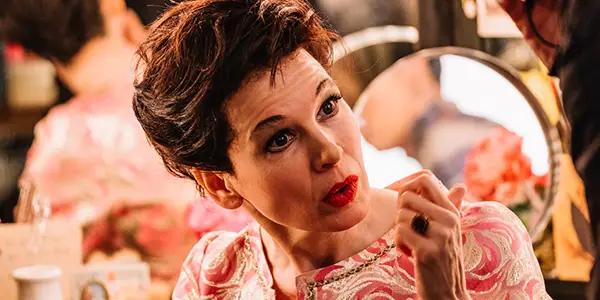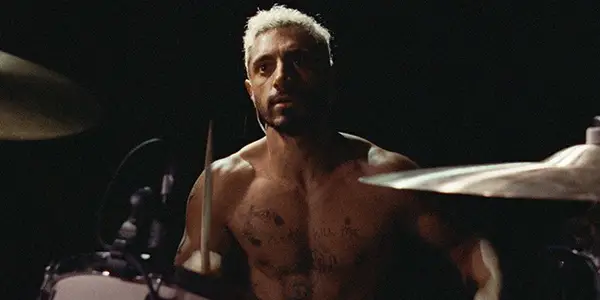TIFF 2019: Final Report: JUDY, THE PERSONAL HISTORY OF DAVID COPPERFIELD & SOUND OF METAL

David is a film aficionado from Colchester, Connecticut. He enjoys…
It’s taken longer than I would’ve hoped, but here it is: my final report from this year’s TIFF! Here, I collected the films that didn’t fit into any definable category, a mish-mash of genres that, as with much of the festival, I found myself enjoying. Let’s get into it.
The Personal History of David Copperfield (Armando Iannucci)

From acclaimed director Armando Iannucci, The Personal History of David Copperfield is an adaptation of the Charles Dickensnovel. Though, as you might have guessed, it’s definitely not your typical adaptation. Starring Dev Patel in the title role, it is also overflowing with other recognizable names, including Tilda Swinton, Hugh Laurie, Peter Capaldi, Ben Whishaw, Benedict Wong, Gwendoline Christie; and the list goes on. It’s a glorious hodgepodge of British talent.
The Personal History of David Copperfield may not quite have the biting wit of some of Iannucci‘s more overtly political satires, such as the fantastic In the Loop, The Death of Stalin, or the HBO show Veep. Yet, it’s a delightfully engaging narrative in its own right, chronicling several distinct periods from Copperfield’s life, from a child struggling to find a home, to an adult struggling to find purpose. But all along the way, he has the support of people around him.
Where Iannucci really excels here is in the film’s precise comedic timing. Some recurring jokes include the many different names from which Copperfield is called, some great puns, and some truly out there, wacky physical comedy. As with Iannucci, it often comes at full speed as well, taking what could be a serious moment and making it exceptionally silly. Tilda Swinton‘s character, for example, is absurdly out of touch with reality, while Capaldi’s seemingly pops up out of nowhere at various points throughout the film.
I have not personally read Dickens‘ novel, but much of the film’s wit still must clearly come from Iannucci. It is something that I could see inspiring people to delve further into the novel, or further, into other adaptations of it. As mentioned, this still isn’t peak Iannucci, but it’s nonetheless well worth the watch.
Judy (Rupert Goold)

Judy is a film I was a bit apprehensive about. Biopics about larger-than-life figures starring talented actors in the lead role have been more common as of late (see: Bohemian Rhapsody or Rocketman). Yet, more often than not, they resemble the former as opposed to the latter, simply expressing a period in the life of said figure and not really embellishing it or making it nearly as interesting as the person themselves. That’s one of the reasons why I think Rocketman worked as well as it did, as it took the figure of Elton John and constructed an elaborate fantasy world around him.
Thankfully, though, Judy is at least somewhat different from your typical stale biopic. Starring Renee Zellweger in a stellar performance sure to be known as her comeback role, it portrays the period later in Judy Garland‘s life, when her fame was somewhat waning after decades of being in the spotlight. As a result, the film humanizes Garland, showing her vulnerability and her struggles behind the curtain, especially given that much of her life was devoted to entertainment.
Even though Judy is a somewhat fresh take on a musical biopic, it still follows some of those same beats. An example is when the film shows flashbacks of Garland as a kid, in which her interactions with higher-ups are about as cliched as you can imagine. In addition, the typical rise and fall pattern that the film takes is a textbook example of the genre. One aspect that does distinguish Judy, though, is that the flashy song-and-dance numbers are really all done by Zellweger. While looking and sounding similar to Garland, she also makes the songs her own, and all-in-all it feels at lot more genuine than, say, the exaggerated lip-syncing done in Bohemian Rhapsody.
Judy isn’t a particularly inventive or game-changing film. Much of its success rides on Zellweger‘s performance. Yet, for a genre that has seen its fair sure of mediocrity in recent years, it’s still a worthy tribute to one of cinema’s great stars.
Sound of Metal (Darius Marder)

Sound of Metal is a film that has been running through my mind a lot since I first saw it. One of the reasons is that it just feels so real. Delving into the story of a heavy metal drummer who is slowly losing his hearing, it’s a devastating, poignant, and ultimately hopeful film, especially for a side of humanity that rarely sees itself portrayed on screen.
Ruben Stone (Riz Ahmed) is a drummer alongside his girlfriend Lou (Olivia Cooke). One night during a performance, though, and for several days following, he gets a ringing sound in his ears, and he starts to hear everything around him as muffled. After seeing a doctor, they confirm what he feared: he has significantly lost his hearing, and it’s only going to get worse. After being in denial, he finally decides to stay at a deaf community, in the hopes that they can help him through this tough transition.
Sound of Metal may be a tad too long, but director Darius Marder still grasps a hold of us for much of it, refusing to let go. Riz Ahmed is astounding as Ruben, taking us through the story beats of a man whose very life is being torn from him, as a musician who lost his hearing. But the deaf community, led by the charismatic Joe (Paul Raci, who delivers a standout performance), helps Ruben come to terms with the new course his life has taken, showing that there is a silver lining in every cloud.
Sound of Metal also, not coincidentally, uses sound (or lack thereof) in a consistently effective way. When we first gain a sense that Ruben is losing is hearing, we hear the muffled noises, while later on, when he is still fighting himself, we gain a sense of that struggle through the use of sound as well. This all comes to a head in the film’s final moments, which is one of the more poetically inspired endings to a film I have seen in some time. Sound of Metal, the narrative directorial debut of Darius Marder, is hopefully the sign of even more good things to come.
Conclusion
So that about concludes my final three reviews from TIFF. Thanks again for joining me on this journey. Join me on my next film-filled adventure soon!
What are your thoughts on any of the films mentioned?
Does content like this matter to you?
Become a Member and support film journalism. Unlock access to all of Film Inquiry`s great articles. Join a community of like-minded readers who are passionate about cinema - get access to our private members Network, give back to independent filmmakers, and more.
David is a film aficionado from Colchester, Connecticut. He enjoys writing, reading, analyzing, and of course, watching movies. His favorite genres are westerns, crime dramas, horror, and sci-fis. He also enjoys binge-watching TV shows on Netflix.













